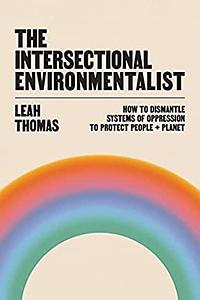Take a photo of a barcode or cover
551 reviews for:
The Intersectional Environmentalist: How to Dismantle Systems of Oppression to Protect People + Planet
Leah Thomas
551 reviews for:
The Intersectional Environmentalist: How to Dismantle Systems of Oppression to Protect People + Planet
Leah Thomas
challenging
hopeful
informative
inspiring
reflective
fast-paced
informative
reflective
sad
medium-paced
A lot of basic stuff I had already learned about, with a few historical pieces I hadn't, which were really fascinating. I would say this is more of a primer for someone new to the idea, with very basic definitions and such, rather than a deep dive into environmental justice history, which is more what I wanted to learn about.
p4-5 "if [the mainstream environmentalist did work], environmental justice outcomes wouldn't be so closely linked to different identity aspects"
20 Combahee River Collective, 1974: twin sisters Barbara & Beverly Smith, Audre Lorde, Demita Frazier, Cheryl Clarke, Akasha Hull, Margo Okazawa-Rey. Chirlane McCray and more
23 Diandra Marizet: "the intercultural expectations placed on women like myself manifested into an ideology we refer to as 'machismo'
27 Kimberlé Williams Crenshaw and the first 3 legal cases to explain intersectional theory 'in the 1976 case DeGraffenreid v. General Motors, the presiding judge ruled that Black women specifically could not be treated as a legally protected class even after only Black women were laid off in a round of firings in which white women and Black men kept their jobs...GM was able to use the existing protected classes to cancel each other out.'
29 "[ecofeminism] is a movement that sees a connection between the exploitation and degradation of the natural world and the subordination and oppression of women" writes Mary Mellor
36 "Terms created by people of color like "identity poltiics" and "intersectional theory" have been polarized and ...taken out of context . How can we combat misuse...? How can we hold space for their original intentions while aplying them to other systems?"
39 mother of env justice, Hazel M Johnson: "while investigating the differences between primarily Black Altgeld Gardens and other Chicago neighborhoods, Johnson found that Altgeld Gardens bore a tremendously disproportionate hazard burden. Just 1.3 of a square mile held contained 50 landfills, hundreds of toxic waste sites, and 250 leaking underground storage tanks."
44 father of env justice, Dr. Robert Bullard: Bullard's wife was working on a legal case challenging the siting of a landfill in a middle-class, suburban neighborhood; the only difference from other neighborhoods its 82% Black residents (Northwood Manor, Houston: Bean v. Southwestern Waste Mgmt)
47 Ayana Albertini-Fleurant, Generation Green: "Advocating for 'justice' becomes tricky when you are not meaningfully enagged in or in control of the processes and systems that distribute environmental burdens and assets."
50 "Shortly after Dr. MLKJr spoke to the Memphis sanitation strikers in 1968, he was assassinated...as many grieved, a largely white environmental movement began to sweep the US"
58 "The EPA has an Environmental Justice in Your COmmunity tool on its website" --true as of 2-13-25
87 "This is a recurring theme...those who are least responsible for the climate crisis are often the most impacted and burdened by it" (reflecting stats first glimpsed in Uninhabitable Earth)**
154-5 "What is an intersectional environmentalist issue that isn't talked about enough?" photo taken 2-13-25
165 Books by yet-unnamed authors: Peter Medoff and Holly Sklar, Winona LaDuke, Victor M Valle and Rodolfo D Torres, Sudhir Alladi Venkatesh, Dorceta E. Taylor
p4-5 "if [the mainstream environmentalist did work], environmental justice outcomes wouldn't be so closely linked to different identity aspects"
20 Combahee River Collective, 1974: twin sisters Barbara & Beverly Smith, Audre Lorde, Demita Frazier, Cheryl Clarke, Akasha Hull, Margo Okazawa-Rey. Chirlane McCray and more
23 Diandra Marizet: "the intercultural expectations placed on women like myself manifested into an ideology we refer to as 'machismo'
27 Kimberlé Williams Crenshaw and the first 3 legal cases to explain intersectional theory 'in the 1976 case DeGraffenreid v. General Motors, the presiding judge ruled that Black women specifically could not be treated as a legally protected class even after only Black women were laid off in a round of firings in which white women and Black men kept their jobs...GM was able to use the existing protected classes to cancel each other out.'
29 "[ecofeminism] is a movement that sees a connection between the exploitation and degradation of the natural world and the subordination and oppression of women" writes Mary Mellor
36 "Terms created by people of color like "identity poltiics" and "intersectional theory" have been polarized and ...taken out of context . How can we combat misuse...? How can we hold space for their original intentions while aplying them to other systems?"
39 mother of env justice, Hazel M Johnson: "while investigating the differences between primarily Black Altgeld Gardens and other Chicago neighborhoods, Johnson found that Altgeld Gardens bore a tremendously disproportionate hazard burden. Just 1.3 of a square mile held contained 50 landfills, hundreds of toxic waste sites, and 250 leaking underground storage tanks."
44 father of env justice, Dr. Robert Bullard: Bullard's wife was working on a legal case challenging the siting of a landfill in a middle-class, suburban neighborhood; the only difference from other neighborhoods its 82% Black residents (Northwood Manor, Houston: Bean v. Southwestern Waste Mgmt)
47 Ayana Albertini-Fleurant, Generation Green: "Advocating for 'justice' becomes tricky when you are not meaningfully enagged in or in control of the processes and systems that distribute environmental burdens and assets."
50 "Shortly after Dr. MLKJr spoke to the Memphis sanitation strikers in 1968, he was assassinated...as many grieved, a largely white environmental movement began to sweep the US"
58 "The EPA has an Environmental Justice in Your COmmunity tool on its website" --true as of 2-13-25
87 "This is a recurring theme...those who are least responsible for the climate crisis are often the most impacted and burdened by it" (reflecting stats first glimpsed in Uninhabitable Earth)**
154-5 "What is an intersectional environmentalist issue that isn't talked about enough?" photo taken 2-13-25
165 Books by yet-unnamed authors: Peter Medoff and Holly Sklar, Winona LaDuke, Victor M Valle and Rodolfo D Torres, Sudhir Alladi Venkatesh, Dorceta E. Taylor
informative
slow-paced
emotional
hopeful
informative
inspiring
reflective
medium-paced
hopeful
informative
medium-paced
informative
fast-paced
Very good introductory text but wish that there was more time taken with each part of environmental justice rather than an overview
The Israel mention at the end was also a bit jarring even if it was just to say Israel has vegans.
I’m excited to see more work from Leah because she is such an incredible voice in the environmental justice movement. I hope the next one will be written for an audience who is engaged with the work and ready to learn more.
The Israel mention at the end was also a bit jarring even if it was just to say Israel has vegans.
I’m excited to see more work from Leah because she is such an incredible voice in the environmental justice movement. I hope the next one will be written for an audience who is engaged with the work and ready to learn more.
informative
inspiring
medium-paced
Gave me great resources and stepping stones to move forward in advocating for and understanding intersectional environmentalism. Covered a wide range of topics in such a way that I feel I have a strong foundation to explore them further.
informative
fast-paced
This was a pretty good review for me, considering my major. I think that this is good for people who don’t know where to start when thinking about the environment and intersectionality. The audiobook was narrated by Leah, herself, which was nice as it reminded me of her podcast as well.
Leah Thomas shares her lived experience as a black woman and environmentalist. This manifesto introduces sociological terms such as "intersectionality" and "privilege". Already familiar with these concepts, I hoped to gain insight on tangible ways to implement intersectional environmentalism in my daily life but felt only the surface was scratched.







